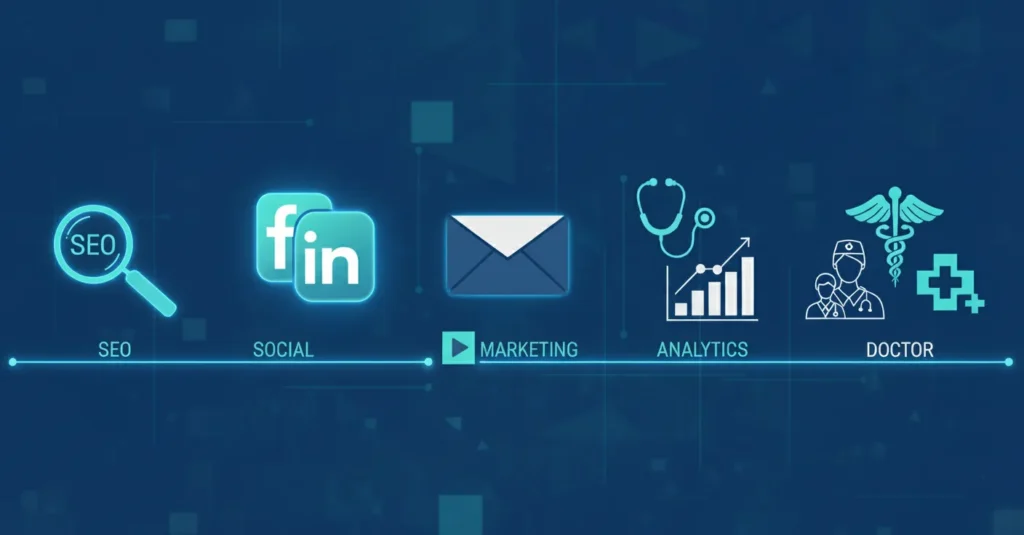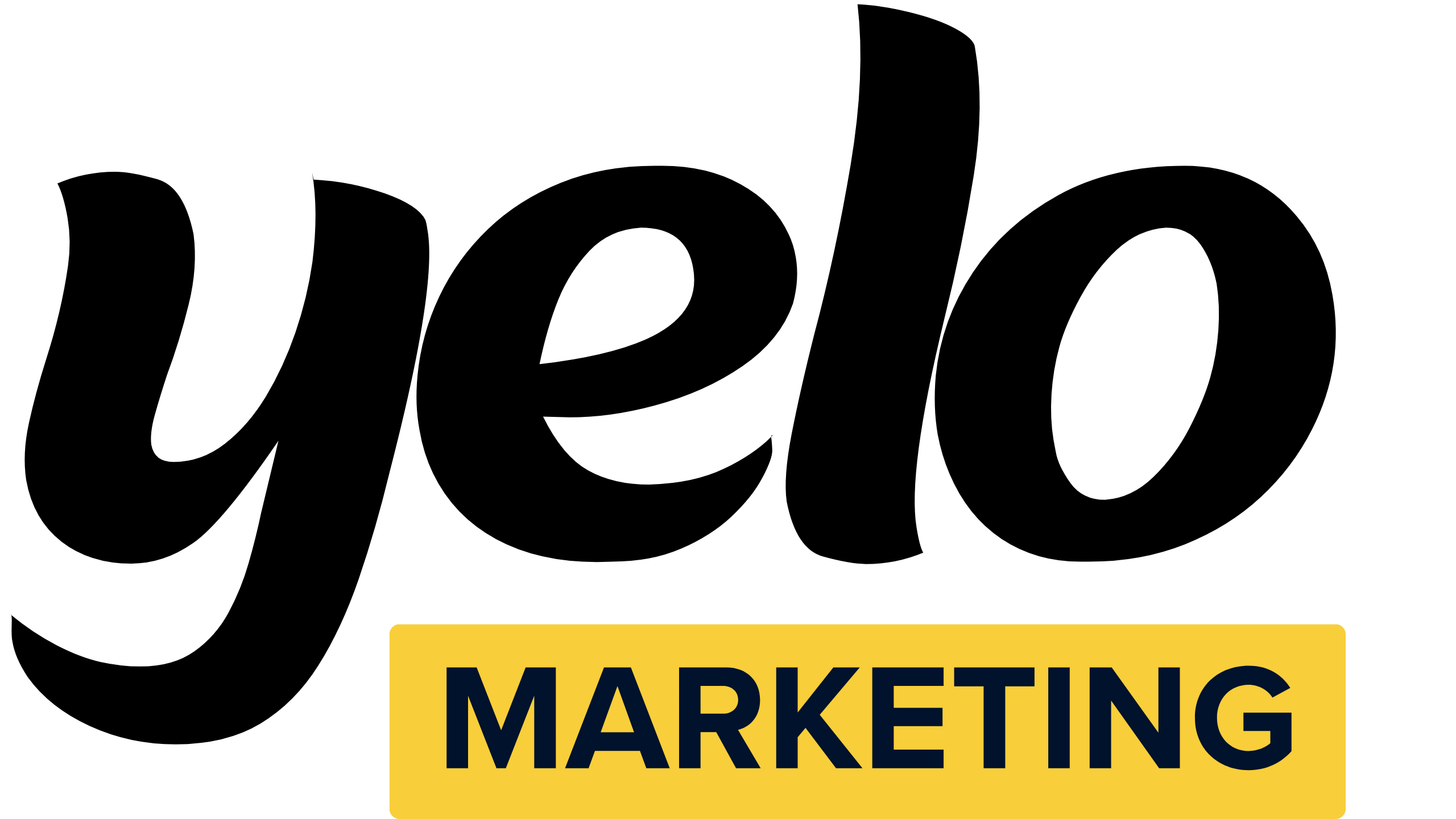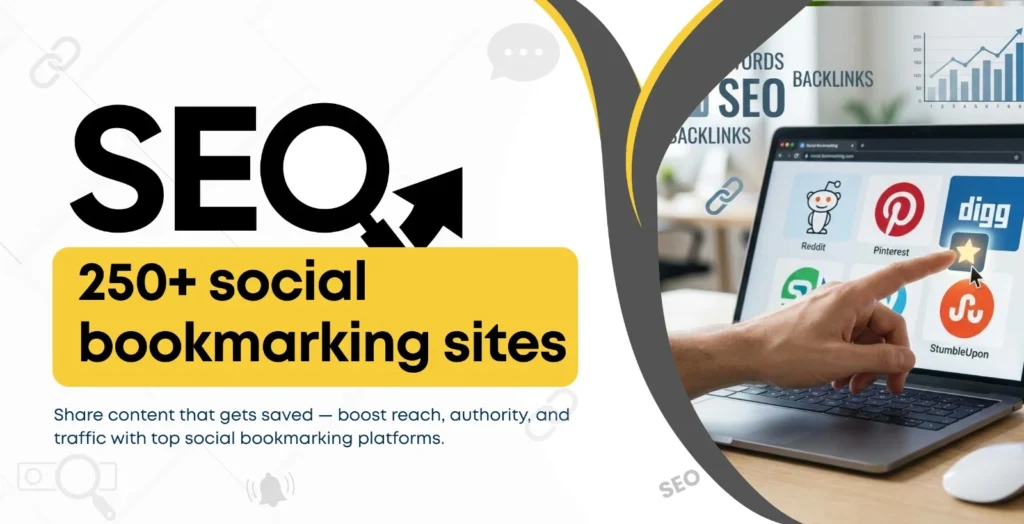The medical and pharmaceutical sectors are quickly evolving, and digital marketing is becoming a crucial component linking patients, providers, and pharmaceutical companies. More than 77% of patients conduct medical research prior to making medical appointments, and almost 70% of healthcare organisations are investing in online operations to reach their audience.
Engaging social media to establish trust via content marketing, digital channels have become core to the healthcare communication stack. Pharma brands have also started to rely on SEO, paid ads, and working with influencers to share the right medical information and advertise treatments successfully.
Let’s learn more about Digital Marketing Strategies for Healthcare and Pharma industries in 2025.
Suggested Read: How Startups in Lucknow Can Compete with Big Brands Using Digital Marketing
Why Digital Marketing Matters in Healthcare and Pharma

Healthcare and pharmaceutical brands need to be careful with their marketing because of regulations, patient privacy, and ethical concerns. But when done right, digital marketing can open up a lot of opportunities. By bringing in skilled digital marketing experts, these brands can reach the right audiences, stay compliant, and connect with patients in meaningful ways.
Improve the engagement of patients
Patient education that can be done by posting blogs, videos with useful information, and holding webinars provides stronger ties. By providing high-quality health information, patients perceive themselves as knowledgeable, special, and more engaged, which develops confidence and loyalty to health providers or brands in the long term.
Better brand image
Communication in healthcare marketing should be conducted regularly and openly. Sharing reliable information, as well as success stories and expert outlooks, will result in building credibility. Patients trust brands that hold honesty and reliability as major priorities, which makes the medical establishment or drug company an expert in the field.
Wider reach
Digital spaces eliminate geographical boundaries and enable health companies to reach out to a wide range of customers across the globe. Patients, physicians, and carers can access online channels, which make sure that invaluable health information, treatment alternatives, and health awareness can reach people nationwide easily and cost-effectively.
Personalisation
Digital technologies can unlock custom healthcare marketing approaches. It is possible to customise campaigns to match demographics, location, or medical conditions so that patients will get a relevant and targeted message. Such personalisation enhances interaction, enhances awareness of treatments, and promotes stronger patient-physician relationships, leading to improved healthcare outcomes.
Cost-effectiveness
Digital marketing can be quantified in terms of its ROI, unlike traditional advertising. Online campaigns mean that the target is narrow, and you end up wasting less money compared to traditional campaigns. Healthcare and pharmaceutical organisations can effectively reach patients through search engine advertisements, social media campaigns, and other highly cost-effective strategies.
Key Digital Marketing Strategies for Healthcare and Pharma

1. Search Engine Optimisation (SEO)
SEO makes pharma companies, hospitals, and clinics present when a patient goes online with a search. As many as 77% of patients Google their choice of doctor prior to booking. With easy words, FAQs, and the help of creating treatment guides, you can rank higher. Local search engine optimization (e.g., dentist in Delhi) is particularly significant.
Quick accessibility through a mobile device website also enhances trust. Clinics that post a blog regularly visit their site 55% more. A skin clinic in Mumbai can get more people to them through skincare blogs and success stories.
2. Content Marketing & Blogging
Trust is created by good content. Individuals are interested in simple-to-read information on symptoms, remedies, and even well-being. Research indicates that 81% of individuals research health issues on the Internet prior to going to a physician. Blogs, treatment FAQs, and patient stories put their questions to rest.
Pharma companies have the opportunity to author articles regarding the usage of medicines, safety tips, and new research. Stable content will give a brand a trustworthy appearance. To give an example, a hospital with cardiology services sharing posts such as “How to distinguish an early heart attack” can educate the audience and help attract more patients.
3. Video Marketing
Videos are entertaining and conducive to understanding. The truth is that 72% of the patients want to know more about health by watching videos. Physicians are able to document a Q&A, describe treatments, or highlight success stories. Cartoon videos explaining the mechanism of action of a drug are quite effective.
Social media platforms such as YouTube and Instagram Reels can raise awareness in the short term. Short health tips in a video attract more viewers than long posts. An example is where a hospital can share a 60-second video on diabetes care, reaching more individuals than a text message.
4. Social Media Marketing
Social media is a valuable means of reaching patients: 62% of patients say that they trusted health information they found online. Hospitals and pharma brands can run awareness-day posts, participate in infographics, or carry out doctor Q&A sessions live.
Interesting posts, such as polls (How well do you know your heart health?) make interaction stronger. LinkedIn is ideal when pharma companies want to reach distributors and doctors.
The trick is to distribute useful, educational, not just promotional, information. Regular posting leaves a certain impression on patients and creates attention.
5. Pay-Per-Click Advertising (PPC) & Google Ads
PPC ads help reach patients faster. For example, 65% of people click Google ads when searching for healthcare services. Hospitals can run ads like “emergency care near me,” while clinics can promote free health check-up camps. Pharma companies can run campaigns for disease awareness.
Geo-targeting ensures ads reach only local audiences. To succeed, landing pages must be simple with clear CTAs like “Book Appointment Now.” Ads highlighting patient benefits, not just features, usually perform better. This helps boost patient enquiries quickly.
6. Email Marketing & Patient Communication
Email is a reliable way to keep in touch with patients. Healthcare emails have an open rate of 23%, higher than most industries. Hospitals can send appointment reminders, wellness newsletters, or follow-up care details.
Pharma companies can share research updates, medicine alerts, or conference invites for doctors. Using automation tools, emails can be personalised for different patient groups, like diabetics or heart patients. Regular, useful emails build loyalty and trust, while also reminding patients to return for care or check-ups.
7. Online Reputation Management (ORM)
When making decisions in healthcare, trust is paramount. 84 % of people trust online reviews like they trust personal recommendations. There is a potential for the negative review to tarnish the image of the hospital.
Creating good credibility by encouraging happy patients to leave a review builds credibility. Some platforms should be monitored on a regular basis, such as Google My Business, Healthgrades, and Practo.
It is professional to react to the complaints fast and in a polite way. Posting positive patient experiences on the internet helps build trust as well. As an example, a hospital that has a 4.8-star rating will have more clients than one with no ratings at all.
8. Technical medicine & app advertisement
The telemedicine sector is burgeoning, and it is projected to hit the $285 billion mark by 2030. Online advertising of teleconsultation services can be beneficial to clinics serving more patients. Apps with such functions as simple booking, e-prescriptions, and reminders enhance engagement. Patients could be reminded about visits or follow-up with push notifications.
Apps also allow pharma companies to reach out to doctors, inform them about drugs, and educate them. Health tips shared within an application keep developers engaged. Telemedicine advertising through social media and advertising increases patient access outside the city.
9. Patient Insights & Data Analytics
Marketing in digital healthcare must be based on data. 79% of healthcare marketers make use of analytics to interpret patient behaviour. Monitoring weblogs, usage of social media, and clicking on emails can help to enhance campaigns. Libraries are also able to know which services patients search for most and give them special marketing attention.
One example will be when “dental implants” have high clicks. The clinic can create more ads and blogs about it. Pharma companies are able to utilise analytics to investigate physician prescription patterns. Data helps in making smarter, cost-effective campaigns with improved outcomes.
suggested read: Small Business Ideas in Lucknow
Challenges in Healthcare & Pharma Digital Marketing
While digital marketing offers immense opportunities, the healthcare sector faces unique challenges:
- Strict regulations – Healthcare marketing must follow medical advertising laws. Any misleading claim can cause legal issues, so campaigns should focus on education, awareness, and compliance instead of aggressive promotions.
- Privacy concerns – Patient data must be kept secure under HIPAA and GDPR rules. Using safe platforms, encrypted systems, and proper consent ensures confidentiality and avoids legal or trust-related problems.
- Misinformation – Sharing incorrect health content can mislead patients and damage credibility. Companies must fact-check information, consult experts, and use reliable sources before publishing to maintain accuracy and patient trust.
- Trust-building – Patients trust brands that communicate honestly and consistently. Sharing success stories, responding to feedback, and maintaining transparency helps healthcare organizations build long-term, meaningful relationships with their audience.
Ending Note
Healthcare and pharma organisations need to evolve past conventional outreach methods and adopt more effective methods of reaching their audience. Digital Marketing Strategies helps to increase visibility through search engine optimisation, create credibility through informative content and engaging campaigns, and improve health outcomes.
Technology and patient-centric strategies can prop up businesses and improve lives, provided healthcare and pharma companies can integrate them. Investing in digital strategies now is an investment in improved healthcare delivery in the future, where patients are informed, empowered, and connected.
FAQs
1. What is healthcare and pharma Digital Marketing Strategies?
Digital marketing in the health sector and drugs uses websites, social networks, e-mails, and videos in order to educate patients, to market services, and to get trust from doctors and patients.
2. Why is SEO useful for medical providers?
SEO makes it possible for hospitals, clinics, and pharma companies to rank in online searches. About 77% of patients look online before going to a doctor; SEO increases presence and takes in more patients.
3. Can healthcare/pharma use social media for marketing?
Yes—it helps promote awareness, health advice, and educational content. Facebook, Instagram, and LinkedIn engage with patients and professionals without violating medical advertising regulations.
4. What are the benefits of content marketing for healthcare?
Content marketing is a way to trust and educate patients. Blogs, FAQs, and videos address questions, explain treatments, and offer wellness advice to help patients be informed and build trust through the brand.
5. What is the role of data analytics in healthcare marketing?
With data analytics, patient engagement is measured, website hits and campaign performances are tracked. It assists healthcare companies with patient needs understanding, optimising marketing tactics, and conducting more powerful, targeted advertising.






